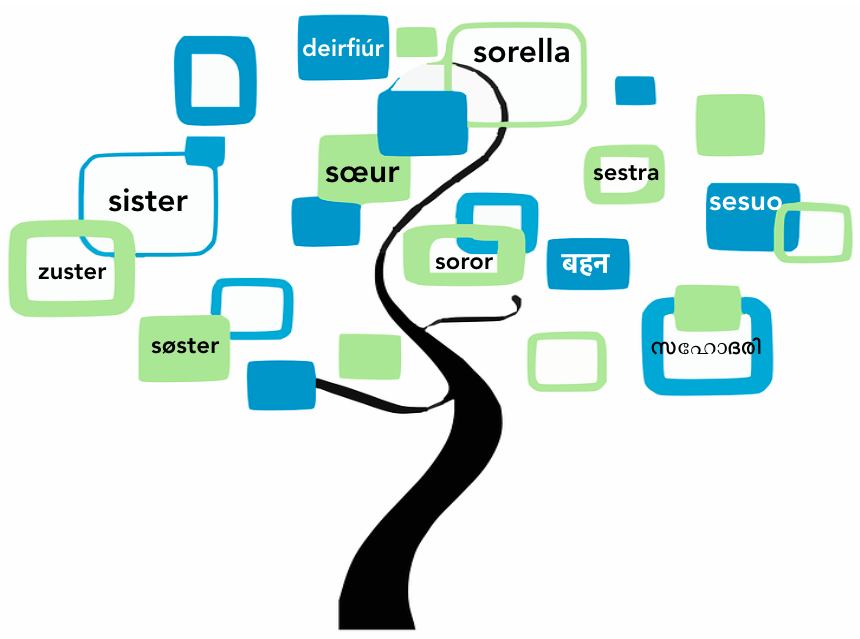A database for exploring the global diversity of kinship terminologies.

Kinship terminology diversity
Kinship terminologies are the sets of words in a language that are used to refer to family members: words like ‘sister’ and ‘cousin’ in English. The world’s 7000 languages each have different words for types of kin, and there is also diversity in the patterns of relatives that particular words refer to: the structural equivalences of systems vary. For example, English speakers use different words to refer to a ‘female sibling’ (sister) and a ‘parent’s sibling’s child’ (cousin). Speakers of Maori (New Zealand) use their sibling words–teina (for a ‘woman’s younger sister’)–to refer also to a ‘woman’s younger female cousin’. English indicates the sex of siblings, but Indonesian only distinguishes sex for older siblings: adik is for ‘younger sibling’ no matter the gender. Maori distinguishes both! This diversity is fascinating, and it is remarkably patterned and structured. But why should we not be free to carve up the social world in other ways–using the same word for ‘mother’s brother’ and ‘younger sister’, for example?
Why is this important?
The KinBank database opens new avenues for research on a phenomena that occurs across all human societies, and has been central to our understanding of human behaviour and sociality. Exploring kinship diversity has engaged anthropologists and linguists for decades, but scholars have lacked a systematic, freely-available, and extensible collection of kinship terminology. Many data reside in private, ad-hoc collections or are buried in dusty monographs or fieldnotes in office drawers. Besides cost-effective use of pre-existing data sources, there is urgency to their systematisation because cultural diversity, especially language, is endangered, and we simply do not know what we know.
The database
KinBank is a key part of the European Research Council project VariKin. While it is work-in-progress, at present we hold terminologies for over 1000 societies, including 14 major language families. For the VariKin project, KinBank is designed to test theories of kinship in a cultural evolution framework, with the primary goal of challenging the existing understanding of the evolution and diversity in kinship terminologies. We’ve focused our data collection on societies linked to language phylogenies, enabling the use of phylogenetic comparative methods. These methods offer analyses such as the ability to reconstruct states of ancestral kinship, test theories of co-evolution, and account for shared ancestry in any cross-cultural analyses. Importantly, the data are linked to other large anthropological and linguistic databases, such as D-PLACE and Glottolog, which means KinBank data will be in a format usable by scholars asking all sorts of questions. We hope to have our first release in 2019.
What is in the database? The collection includes terms ranging from grandparents to grandchildren (G-2 to G+2 for the kinship nerds), parents’ siblings, and parent’s siblings children. We also collect terms for relatives by marriage (nuclear kin’s affines). Where they exist, we also record terms that differ for sex of speaker, relative age, and by age of connecting relative. Each term has a referenced source, and each language is linked to other cultural/linguistic databases.
Languages will be searchable by name, glottocode, or via their location on an interactive map. A language-specific page will visualising the kinship terminology on a family tree, with terms, comments, and references underneath. All data will be downloadable either by language or as an SQLite database available in github. Kin-terms will also be displayed on available language phylogenies (such as Austronesian, Bantu, or Dravidian), offering visualisations on the historical diversity of kinship terms. A contact form will enable users to query, add, or edit terms for exiting languages or to suggest the addition of new languages. If you have any queries or data you think might be useful please contact us on varikin-project@bristol.ac.uk.
The team
Kinbank data has been primarily collected by the VariKin team and affiliates based at the University of Bristol, and the Parabank team based at the Australian National University, with help from other colleagues since 2010.
@ University of Bristol
Fiona Jordan
Principal Investigator and Project Lead
Sam Passmore
Project Management and Database Design
Catherine Sheard
Project Management and Data Collection
Data Collection
Paraskevi Argyriou
Jasmine Calladine
Isobel Clifton
Angarika Deb
Lucy Harries
Jo Hickey-Hall
Peter Racz
Sean Roberts
Rob Ross
Ewan Thomas-Colquhoun
@ Museu Goeldi, Belem, Brazil
Joshua Birchall
Luis Henrique Oliveira
@ Australian National University
Wolfgang Barth
Nicholas Evans
Simon Greenhill
Kyla Quinn
@ Max Planck Institute for Psycholinguistics
Anouk Diederen
Lieke Hoenselaar
Maarten van den Heuvel
Funding
Primary funding for the VariKin project comes from the European Research Council (ERC) under the European Union’s Horizon 2020 research and innovation programme (Grant agreement No 639291, Starting Grant VARIKIN).
We have also benefited by funding from:
- Leverhulme Research Fellowship 2015-16 (#47690)
- British Academy International Mobility Partnership Grant 2016-17
- University of Bristol Faculty of Arts Summer Internships
- Max Planck Institute for Psycholinguistics